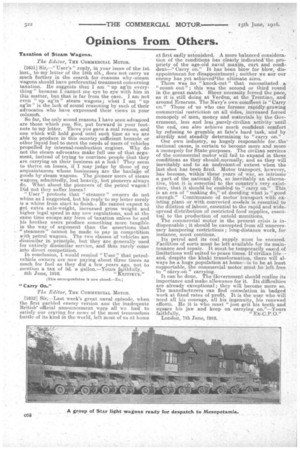Opinions from Others.
Page 18

If you've noticed an error in this article please click here to report it so we can fix it.
Taxation of Steam Wagons.
The lidtgor, THE COMMERCIAL MOTOR.
[1631] Sir,—" User's" reply, in your issue of the 1st inst., to-my letter of the 18th ult., does not carry us much further in the search for ,reasons why ,steam wagons should have preferential treatment concerning taxation. He suggests that I am "up ag'in everything " because 1 cannot see eye to eye with him in this matter, but that is far from the case. I am not even "up ag'in" steam wagons.; what I am "up ag'in" is the lack of sound reasoning by such of their advocates who have expressed their views in your oolumrls.
So far, the only sound reasons I have seen advanced are those which you, Sir, put forward in your footnote to my letter. There you gave a real reason, and one which will hold good until such time as we are able to produce in this country sufficient benzole or other liquid fuel to meet the needs of users of vehicles propelled by internal-combustion engines. Why do not the steam advocates make full use of that argument, instead of trying to convince people that they are carrying on their business at a loss ? They seem to thrive on losses, if I may judge by those of my acquaintances whose businesse9: are the haulake of goods by steam wagons. The pioneer users of steam
wagons, admittedly, lost heavily, but pioneers always do. What about the pioneers of the petrol wagon? Did not they suffer losses? " User" protests that "-steamer " owners do not whine as I suggested, but his reply to my letter surely is a whine from start to finish. He cannot expect to get extra axle-weight, increased gross weight and higher legal speed in any new regulations, and at the same time escape any form of taxation unless he and his brother users produce something more tangible in the way of argument than the assertions that • "steamers" cannot be made to pay in competition with petrol wagons. The two classes of vehicles are dissimilar in principle, but they are generally used . for entirely dissimilar service, and thus rarely come into direct competition.
In conclusion, [would remind "'User " that petrolvehicle owners are -now paying about three times as much for fuel as they dida few years ago, not to mention a tax of 3d. a gallon.—Yours fAithfUlly, 8th June, 1916. "KRITIKUS." This correspondence is now closed—En] " Carry On."
The Editor, THE COMMERCIAL MOTOR.
[1632] Sir,—Last week's great naval episode, when • the first garbled enemy version and the inadequate British* official announcement were all we had to . satisfy our craving for news of the most tremendous battle of its kind in the world, left most of us at home at first sadly astonished. A more balanced consideration of the 'conditions has clearly indieatecl'the propriety of the age-old naval maxim, curt and confident—" Carry on." It has been blow for blow, disappointment for disappointment ; neither we nor our enemy has yet achieved'the ultimate aims. There was no " knock-out " that necessitated a "count out" ;• this was the second or third round in the great match. • Sheer necessity forced the pace, as it is still doing at Verdun, at the Trentino, and around Erzerum. The Navy's own:comilent is "Carry on." Those of us who can foresee rapidly-growing commercial restriction on all sides, increased forced monopoly of men, money and materials by the Government, less and less .purely-civilian activity until the end, can also achieve much confident comfort by refusing to grumble at fate's hard task, and by sturdily and steadily determining to "carry on."
Our own industry,, so hugely responsible for the national cause, is certain to become more and more a monopoly for State purposes. The civilian services . of the commercial motor will fail to expand in these conditions as they should-,,nqrmally, and as they will inevitably and to an undreamt-of extent when the last shot has been fired. Motor transport, however,, has become, within these years of war, so intrinsic a part of the national life, so inevitably an alternative, that it is essential to the country"s .very existence, that it should. be enabled to "carry on." This is an era of "making do," of deciding what is "good enough." Continuance of motor transport with existing plant or with converted models is essential to the dilution of labour, essential to the rapid and widespread distribution of restricted food supplies, essential to the production of untold munitions.
The commercial motor in the present crisis is indispensable ; it should be exempted from all unnecessary hampering restrictions ; long-distance work, for instance, must continue.
Its petrol and its coal supply must be ensured. Facilities of sorts must be left available for its maintenance and repair. It. must be temporarily eased of limitations well suited to. peace times. If civilian life— . and, despite the khaki transformation, there will always be a huge population at home—is to be at least supportable, the commercial motor must he left free to carry-on " carrying. . It can be done. The Government should realize its importance and make allowance for it. Its difficulties are already exceptional ; they will becothe more so. The manufacturers can firid consolation in badged work at fixed rates of profit. It is the user who will need all his courage, all his ingenuity, his renewed efforts. He it is who must "just -grit his teeth and square his jaw and keep on carrying on."—Yours faithfully, London, 7th June, 1916.




















